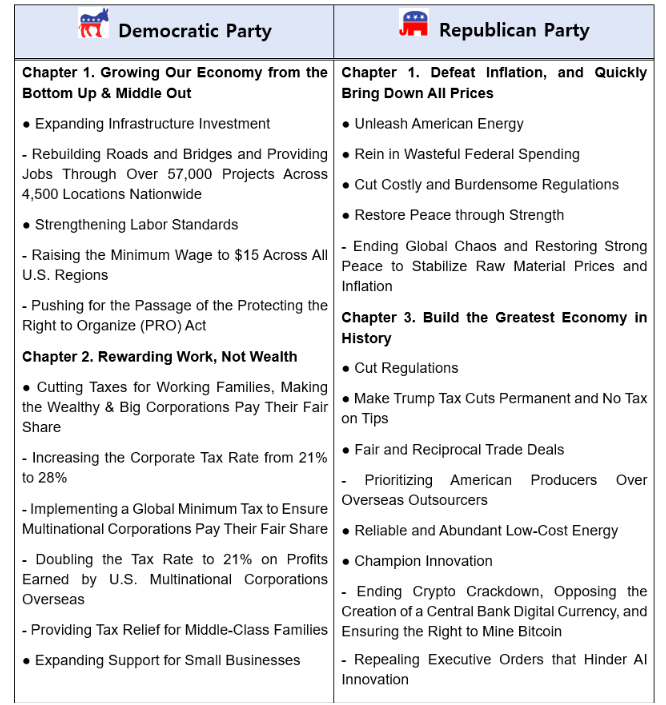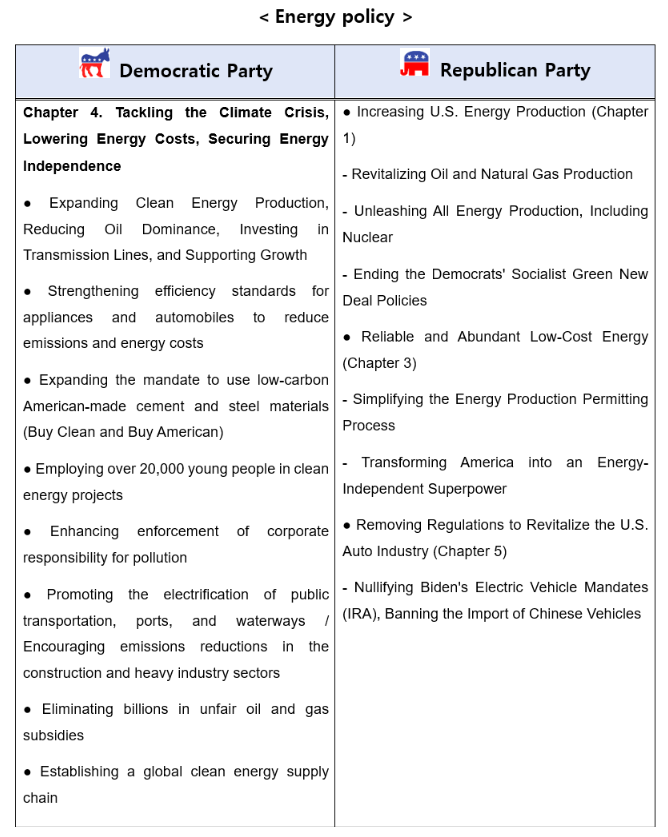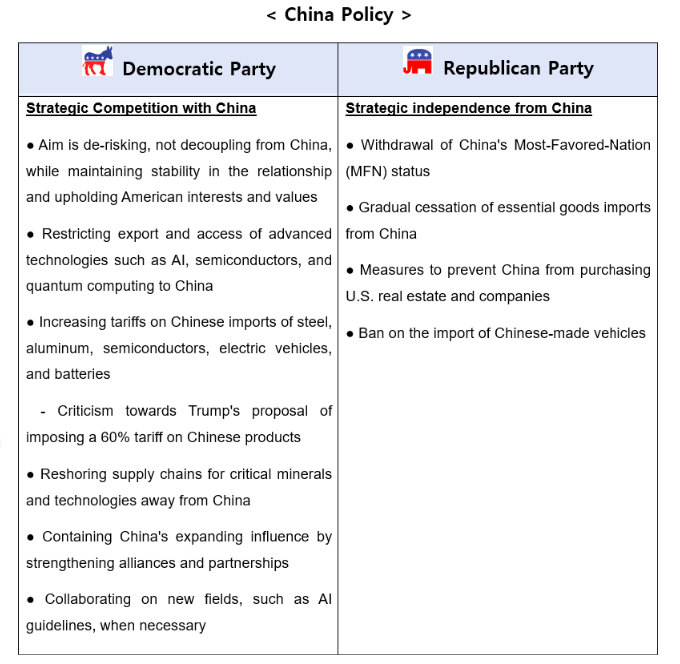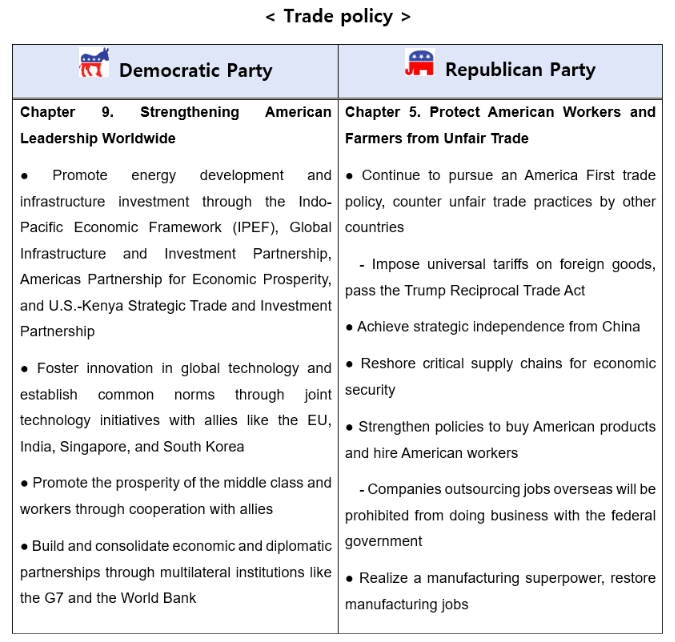News & Events
Press Releases
Analysis of Economic Policy Stances of Both Parties in the 2024 US Presidential Election
|
Democrats and Republicans Diverge 180°
on Economic Policy Directions for the Presidential Election …
- [Corporate Tax] Democrats Propose Increase (21%→28%) vs. Republicans Aim for Reduction to 15%
- [Energy] Democrats Advocate for Clean Energy Expansion vs. Republicans Push for Revival of Oil, Gas, and Nuclear Energy
- [Trade] Democrats Focus on Strengthening Partnerships vs. Republicans Aim for National Interests Through Universal Tariffs
- Apart from Strong Policies Towards China, Strategic Differences Between Democrats and Republicans are Clear
With approximately 100 days remaining until the U.S. presidential election, a clear divergence in the economic policy stances of the Republican and Democratic parties has emerged, prompting a call for meticulous responses from the Korean economic sector.
The Federation of Korean Industries (FKI) analyzed the platforms and policy directions of the Republican and Democratic parties for the 2024 presidential election. The analysis revealed significant differences in most policies between the two parties, underscoring the need for a comprehensive strategy involving both the government and the economic sector.
[Corporate Tax] Democrats Propose Increase from 21% to 28% vs. Republicans Announce Commitment to Comprehensive Tax Cuts
Examining the economic and industrial policies of both parties, the Democrats emphasize corporate tax increases and worker-centric policies such as minimum wage hikes, while the Republicans focus on deregulation, tax cuts, and promoting technological innovation.
With the recent expansion of U.S. investments by Korean companies, changes in U.S. corporate tax rates are expected to significantly impact on Korean companies. The current corporate tax rate of 21% is set to expire at the end of next year. The Democratic platform specifies an increase in the corporate tax rate to 28%. On the other hand, the Republican platform does not provide specific numbers but expresses a commitment to comprehensive tax cuts. Last month, former President Trump, in an exclusive interview with U.S. media, detailed his aim to reduce the corporate tax rate to as low as 15%, with a minimum target of reducing it to 20%.
[Energy] Democrats Advocate for Clean Energy Expansion and Oil Suppression vs. Republicans Push for Revival of Oil, Gas, and Nuclear Energy
Energy policy is a field where the stances of the Democrats and Republicans diverge sharply.
The Democrats, plan to increase investments in clean energy, strengthen energy efficiency standards, and mandate the use of American-made low-carbon materials, aiming to create over 20,000 jobs through the Green New Deal project.
In contrast, the Republicans advocate for "increasing production of all energy sources, including oil, natural gas, and nuclear energy." They intend to completely roll back energy-related regulations and relax restrictions on nuclear power plants. Unlike the Democrats, who are focusing on strengthening environmental standards, the Republicans emphasize simplifying the energy production permitting process. It is noteworthy that while the Republican platform included the promotion of clean energy development in the 2020 election, it makes no mention of it this time.
Additionally, although the Republican platform does not directly address the Inflation Reduction Act (IRA) subsidies, it explicitly mentions canceling Biden’s Electric Vehicle Mandates, indicating their opposition to policies promoting electric vehicles. However, the complete abolition of IRA subsidies would require the Republicans to hold majorities in both the House and Senate, making the results of the congressional elections critical.
The outcome of the U.S. presidential election is expected to significantly impact different sectors of the energy industry. If the Democrats win, clean energy-related projects are likely to expand, while a Republican victory would likely boost the nuclear and traditional energy sectors. Korean companies need to closely monitor the U.S. presidential election and its results to identify potential opportunities.
[China Policy] Democrats Advocate for Strategic Competition vs. Republicans Aim for Strategic Independence
Both the Democratic and Republican parties have adopted a tough stance on China in their platforms. However, their detailed strategies are different. The Democrats advocate for maintaining stability in relations with China through a "derisking" approach, while the Republicans declare "strategic independence" from China.
The Democrats intend to firmly impose sanctions on China in areas such as AI, semiconductors, critical minerals, steel, electric vehicles, and batteries, but they leave room for cooperation with China in new fields if necessary, instead of pursuing a "complete decoupling."
The Republicans express a strong intention to impose sanctions in trade and investment, including withdrawing China's Most-Favored-Nation status, gradually stopping imports of essential goods, such as electronics, steel, and pharmaceuticals, from China, banning Chinese purchases of U.S. real estate and businesses, and prohibiting imports of Chinese-made vehicles. Notably, the Republican platform does not include Trump's proposal to impose a 60% tariff on Chinese products, which was one of his 2024 campaign promises.
Regarding this, FKI explained that the Democrats are focusing on containing China in the core advanced technology sectors and supply chain areas, while the Republicans have declared their bold implementation of exclusive trade and investment sanctions against China. FKI noted that companies in the U.S. dealing with advanced technologies and essential goods need to reduce their dependence on China and diversify their supply chains regardless of which candidate wins the election.
[Trade] Democrats Not Present Any Specific Policy Stances vs. Republicans Strengthen America First Policy
In the trade and commerce sector, the Republicans have proposed a variety of strong trade policies, whereas the Democrats have not presented any specific policy stances.
While the Republicans did not propose any specific trade promises in the 2020 election, their current platform includes a dedicated chapter (Chapter 5) on trade, underscoring their commitment to "America First" policies. The Republican platform highlights the $1 trillion trade deficit, explicitly stating the imposition of universal tariffs and the passage of the Trump Reciprocal Trade Act. They also emphasize policies like "Buy American, Hire American" and warn of stringent measures such as banning companies that outsource jobs from doing business with the federal government. However, the platform does not specifically address whether universal tariffs would apply to FTA countries like South Korea, which is a point of interest for the Korean economic community.
The Democrats have not specified any detailed trade policies. The Federation of Korean Industries (FKI) expects the Democrats to maintain existing trade policies, considering their emphasis on "strengthening America's global leadership." This year's Democratic platform places greater emphasis on multilateral cooperation and economic collaboration with allies, such as through the Indo-Pacific Economic Framework (IPEF) and the Partnership for Global Infrastructure and Investment (PGII), compared to their 2020 election platform.
Bong-Man Kim, head of the International Affairs Department at FKI, stated, "While both parties share a broad 'America First' theme, the policy differences have become more pronounced compared to the 2020 election, necessitating thorough preparation of both Plan A and B from our economic sector and government." He also emphasized, "Given the stark contrast in energy policies highlighted by both parties, our companies need to prepare tailored strategies, and the government must respond to policy changes in areas with significant investments in the U.S."
Kim further noted, "Regardless of which administration takes office, the need for cooperation between the economic sector and the government has grown to minimize uncertainties for Korean companies and to convey their views to the next U.S. administration."
Economic Policy Stances of Democrats and Republicans
< The overall economic and industrial policies >




1. The Republican Party Platform (Full Text)
https://www.documentcloud.org/documents/24795052-2024-gop-platform-july-7-final
2. The Democratic Party Platform (Full Text)
https://www.politico.com/f/?id=00000190-acc7-da7b-a393-adc723860000